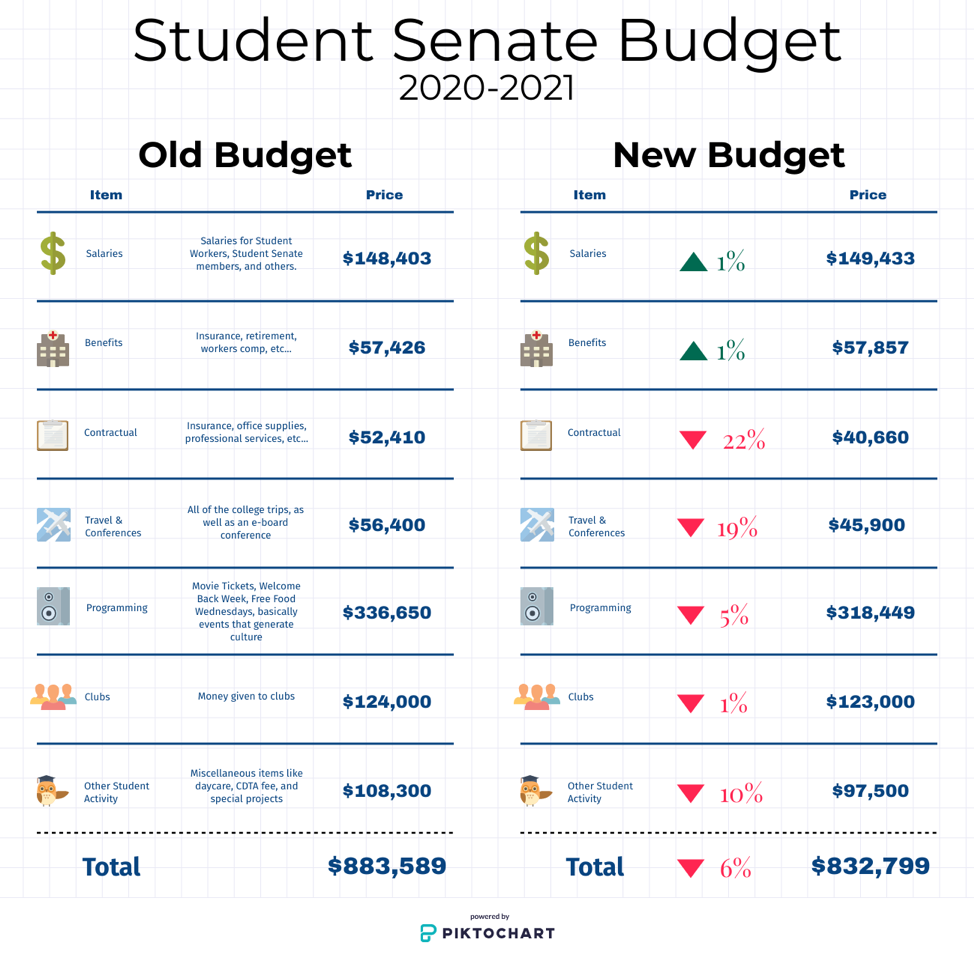Student Senate budget spark confusion and division

By: Seth Brokalis
Junior Layout Editor
Ever wonder where the small “Records and Activities Fee” on your bill goes?
Out of the approximately $165 fee, about $65 goes to Student Activities. The total budgeted amount this year was $883,589.
Despite this, we are still left asking ourselves why there is so little student involvement. Out of 11 interviewed students, they all felt like Student Activities did not fully return that $65 through various events and activities on campus.
“Considering I have class when all the events are going on, I’ve never gotten the free pizza things or anything like that,” said Daniel Martinez, who is part of the Entrepreneurship Certificate Program on whether or not the money is well spent.
This applies to a lot of students, especially evening students that can’t attend the events that take place during the day.
The remarkable sparsity of students at campus events leads a raised brow in the direction of the student senate. What is all this money being spent on?

Of that $883,589, about $500,000 goes to activities that generate culture on campus.
Next year’s budget will be even less due to decreasing enrollment. That raises questions of how the senate can increase student involvement next year with even less of a budget.
The new budget began being worked on in December. Student Senate Treasurer Lya Zhang was the chairwoman of the finance committe.
Zhang said they had to make a lot of cuts to next year’s budget due to lower enrollment.
“We are expecting a lower number of people enrolling next year,” Zhang said. “So because there is a lower number of people, the budget is going to be lower.”
The new budget included about a $50 thousand reduction in revenue. Because of this, many other things needed to be cut.
Travel, conferences, programming and other student activities took the brunt of these cuts. Between these expenses, there was a total of $40 thousand cut. The other $10 thousand came from reduced contractual expenses.
Travel includes trips such as the Boston Day Trip, New York City Day Trip and any other trips for students.
The “conferences” expense only includes one item, the Student Senate Leadership Conference. This item totals $10 thousand.
Student Senate President Zion Sherin explained the programming expense.
“The programming line, for anyone who is unaware, is basically the events we plan on campus,” said Sherin.
This year, some examples of programming are Homecoming, Welcome Back Week and Pumpkin Palooza.
Other student activities include miscellaneous items such as the CDTA bus fee as well as the daycare program.
This original budget was met with some changes once it reached the senate. The final vote was cast on Feb. 3, 2020. Before that, there were two proposed amendments.
The first was from Sherin. According to the meeting’s minutes, this amendment would completely cut out the leadership conference and move it to other lines.
Sherin said that he no longer thought it was a good return on investment to students.
“If I were to have voted, I would vote against it,” said Sherin.“I don’t think it accurately represents the investment we return to the campus.”
This amendment was shut down in the senate. The final vote was 0 in favor, 6 opposed and 8 abstentions. There was none in favor because as Student Senate President, Sherin cannot vote for his own amendment.
Sherin said there were a few explanations as to why it may have been shut down.
“In all fairness I think part of the reason for my amendment being shut down was definitely students being concerned how other students would view them,” said Sherin in regard to the abstaintions. “If it was truly that people didn’t like it, they would have voted against it.”
The second amendment was by Zhang. This amendment was a simple change taking $2,000 from programming and giving it to clubs.
Even though the senate may have many differing opinions, the majority seemed to believe that clubs should stay fully funded.
“I am very passionate about keeping clubs fully funded,” said Sherin.
“Cutting club budgets is something I could have never supported,” an anonymous senator said.
The final vote for this amendment was 9 in favor, 0 against and 5 abstentions.
One surprising vote on this amendment was Lya Zhang’s. According to the anonymous senator, she abstained from voting on it. When asked why, she offered no comment.
The final budget passed with 11 votes in favor, 2 against and 2 abstentions. According to Sherin, this vote showed a good deal of uncertainty.
“Just for reference, last year I believe we had one abstain from the budget, everyone else was in favor,” said Sherin.
Overall, there was a sense of confusion with this budget in general.
“I think they were slightly confused about all the amendments and such,” said an anonymous senator.
Sherin said that uncertainty also may have caused some people not to show up to vote.
“It’s very nice that we got the budget passed in time,” said Sherin “That being said, there definitely were some students who felt unsure of the budget.”
Vice President Farkhondeh Tajik mentioned that “there is division, whether people admit it or not.”
The division is also prominent in the Student Senate e-board according to Sherin.
“I think the fact that there were multiple e-board members that didn’t vote in favor of the final budget says something,” he said.
Sherin did have a few ideas on how to improve the voting system for next year.
“We might do breakout sessions with small groups and people can talk about it with each other,” said Sherin.
The budget this year was filled with confusion and conflict. There is hope that next year will be better, but the finance committee will continue to have to deal with decreasing enrollment. Hopefully the senate will be able to increase student involvement in other ways than just throwing more money at it.
